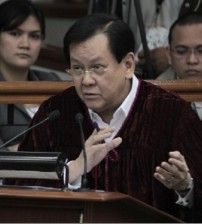Senator Sergio “Serge” Osmeña III, chairman of the Senate committee on banks and financial institutions, has threatened to reveal the names of the “three or four” senators supposedly causing the delay in the approval of the last set of amendments to the Anti-Money Laundering Act (Amla).
Osmeña aired the warning after the Financial Action Task Force (FATF), a Paris-based global group monitoring terrorist activities and finance, decided not to put the Philippines on its blacklist of uncooperative countries.
Authorities have warned that inclusion in the blacklist would make it more difficult and time-consuming for overseas Filipinos to send money home.
“We got lucky because Amla executive director Vicente Aquino was able to convince FATF that the Senate is making every effort to pass the amendments. We missed six months of legislative work due to the impeachment trial (of Chief Justice Renato Corona),” Osmeña said.
The FATF had initially set an Oct. 19 deadline for President Benigno Aquino to sign the third Amla amendment to fully comply with its requirements and evade inclusion in its blacklist.
Osmeña said the Senate should be able to pass the third amendment by January before Congress adjourns the following month ahead of the 2013 elections.
The senator said that during a recent caucus, some colleagues indicated their objection to the inclusion of tax evasion among the predicate crimes and real estate purchases among the activities that should be reported to the Anti-Money Laundering Council (AMLC).
No objections
However, Osmeña expressed frustration that these senators did not voice their objections during the period of interpellation where they were expected to debate the merits of these issues.
“They are always very vague and those who have objections do not want to state it on the floor when it is precisely the nature of legislation to discuss these things there. If we disagree on anything, we ask for a division of the house and take a vote. They would not do that,” Osmeña said.
“I threatened to reveal their names if we are blacklisted, if they pull (a delaying) stunt. I promise to tell the Filipino people who they are. I think they are selling the country short. They are making all sorts of excuses,” he added.
Osmeña said some of the senators were “vocal” while others were issuing statements “through their colleagues” during the caucus.
He said he stressed during their meeting that “most advanced countries” were the ones pushing for the stricter monitoring of financial transactions because of the potential of being abused by terrorist or criminal groups.
Osmeña noted that real estate transactions were among the 23 “activities” that require reporting to the AMLC. Others include casino winnings and the purchase of art and high-end jewelry.
Via real estate
He said drug dealers were known to purchase real estate to launder their illegal earnings.
He said reporting real estate transactions was already being done by other countries that have close economic ties with the Philippines like the United States, United Kingdom, Japan, Australia, Indonesia, Singapore and Hong Kong.
Osmeña said he pointed this out when the other senators asked about the Philippines appearing to have been singled out by the FATF.
The senator said the inclusion of new activities and predicate crimes was not a local initiative. It was a product of the FATF’s constant monitoring of creative ways of terrorist financing.
Senate President Juan Ponce Enrile said some members also expressed hesitance at including tax evasion among the predicate crimes covered by Amla since the Bureau of Internal Revenue (BIR) can adequately monitor this shortcoming.
“The BIR can do it without involving the AMLC. Some senators are also worried that including tax evasion in Amla per se could be used as an instrument of political persecution,” he Enrile said.
On Saturday, Justice Secretary Leila de Lima said the AMLC had enough powers to investigate and go after suspected money launderers.
De Lima issued the statement in reaction to the Senate’s failure to pass a crucial amendment to Amla as required by the FATF.
